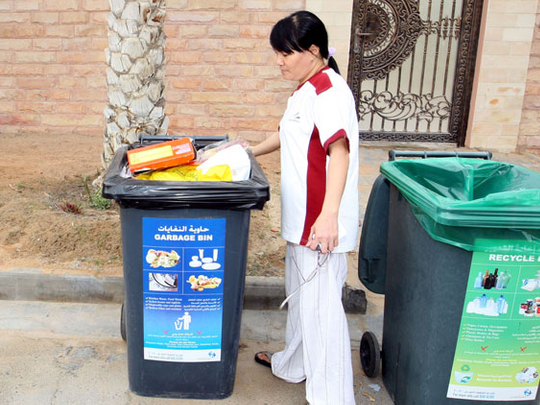
Dubai: Educating housemaids on recycling is the municipality’s focus right now, as they are the ones who tend to misuse recycling bins in residential neighbourhoods given their job responsibilities.
Since maids are often in charge of all things domestic in the house, many simply dispose of discarded family items without thinking that some of the material being thrown out can be diverted from the waste stream for recycling.
Glass, newspapers and plastics are valuable recycling materials that once segregated are collected by waste firms, bundled and sold domestically or internationally for other uses.
“We’re carrying out our recycling master plan until 2030 and our major key point is to reduce waste from the source and recycle it. A minor problem that we are facing is that housemaids do not understand how to properly recycle, particularly among those who are employed as uneducated and cheap labour,” said Abdul Majeed Saifaie, director of Waste Management Department at Dubai Municipality.
Dubai Municipality has teamed up with the waste treatment company Tadweer for several years now to collect waste and recyclables and as part of its segregated home recycling plan, has set up two bins earlier this year — for organic and non organic waste — in 3,770 homes in Mizhar 1 and 2, as well as in Nad Al Hammar, leading to a total of almost 8,000 new bins.
“We have requested the company to send female employees to the homes and explain to the homemakers and housemaids how to segregate the waste into the bins, but residents continue to face problems. We are working on these [glitches] and will incorporate some new changes once we enter the second phase of the recycling programme,” explained Saifaie.
The recycling project for the time-being focuses on Emirati homes, and the second phase will incorporate the homes of Emiratis and expatriates in six new areas in 2013, including four areas in Bur Dubai, as well as in Jumeirah and Al Barsha.
He also noted that rubbish collectors pick up organic waste from the bins on a daily basis, while they collect non-organic waste twice a week from homes.
In a survey recently conducted by Dubai Municipality, 80 per cent of respondents said they were satisfied with the home segregation recycling programme, while 77 per cent said they were aware about the purpose and importance of the project.
“We are now doing a field study of homes in various areas and every year we will be adding more residential areas into the project,” he said, pointing out that 16 per cent of waste is being recycled as opposed to five per cent during the first three months of the pilot project.












